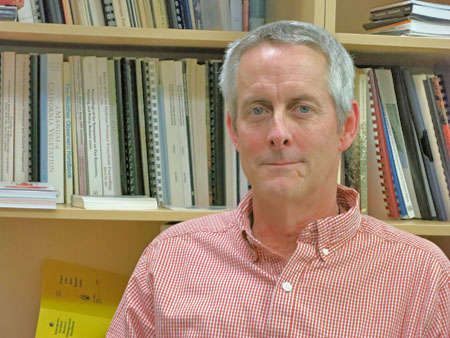
After five years with the National Park Service (NPS) and 16 months as the Fire Management Officer (FMO) for the NPS’s Pacific West Region, Sid Beckman looked comfortable today in his office on the fifth floor of a high-rise building in downtown San Francisco. He came to the position after 29 years with the U.S. Forest Service (USFS) and three years in the fuels side of the program under Regional NPS FMO Sue Husari who retired after 39 years of federal service.
This week Mr. Beckman and his staff are looking back at the last year to see if there are any lessons learned that should be addressed as they move into Fire Season 2014. They are going through program reviews, preparedness reviews, and accident investigations looking for common themes. Individual reports are of course read routinely, but this is the first time NPS fire management in the region, at least in recent years, has studied a variety of documents at the end of a fire season looking for common threads. Their findings will be presented upstairs to the Regional Director, the Assistant Regional Director, and the park FMOs in the region.
The fire budget for the NPS, after suffering a 30 percent decline, stabilized this year, and his understanding is that next year’s budget will be similar.
We asked about the impacts of the 257,000-acre Rim Fire that started outside Yosemite National Park but burned into some of the back country areas of the park. Gus Smith, the park’s ecologist, is leading a fire science team in an effort to determine the research needs related to the effects of the huge fire. Some of the topics they will look at include how previous prescribed fire and fuel treatment projects affected the fire, and if they were effective in mitigating the fire behavior as the fire approached or burned through the areas. The USFS is also involved in looking at the effects of the fire, which cost about $127 million to suppress.
Mr. Beckman described how firefighting has changed during the course of his career.
My first season was in 1976. I worked on hotshot crews in southern California. You worked for a Superintendent, you showed up for work, you wore your boots, you spoke when spoken to, and that was your job. Now, we’ve shifted to a learning culture. And I truly believe that today we have greatly improved the training of our firefighters and our expectation for them to be part of the process. It is not the safety of the individual alone but the safety of the entire team. Now firefighters have a voice. Firefighting is some of the hardest, most challenging work we can do. At times it is dangerous. Most of the time it is dangerous. And the danger is not just on the fire line, but traveling to and from. You can get hit by a rock or a tree — that is far more common than burn overs.
When asked what he liked most about the job, he said:
Hopefully, that I’m supporting people in the field, that the decisions we’re making at this level are helping them and making their job easier.
We told Mr. Beckman about a large sign that Rick Gale, the former Chief Ranger of the NPS in charge of fire and law enforcement, posted above his office door in Washington, DC. It read: “What have you done for a Park today?”
When we asked what he liked least about his job, he smiled and said:
Filling out my travel [forms] online.
His advice for a firefighter that might want to advance into an upper management position at a Park, Forest, State, or Regional Office, included:
First of all become a good firefighter. And when I say become a good firefighter, understand fire. Understand fighting fire, understand lighting fire, understand managing fire. Get those root skills. Spend time in the dirt dragging your knuckles. Don’t get in a hurry to get to the top. Because you’re going to learn the most when you’re out there making those decisions in the field.
And then take every opportunity to learn. When you’re on the fire line find the old salts. Pay attention to what they are doing.
If the agency offers you the opportunity in the off season to get some formal education never turn it down. Don’t get preoccupied with getting a Red Card as much as becoming smarter and more knowledgeable about what you do. And that includes all the things that may not seem important like understanding fire policy.
[Paul] Gleason talked about being a “student of fire”. There’s the fire side, and then there’s the fire management side and understanding all of that. That was the biggest benefit to me, taking those opportunities to raise your hand when it really didn’t sound that exciting, “Hey, do you want to learn about NEPA [National Environmental Policy Act]?” Then you understand how the machine works, and hopefully learn to make better decisions.
